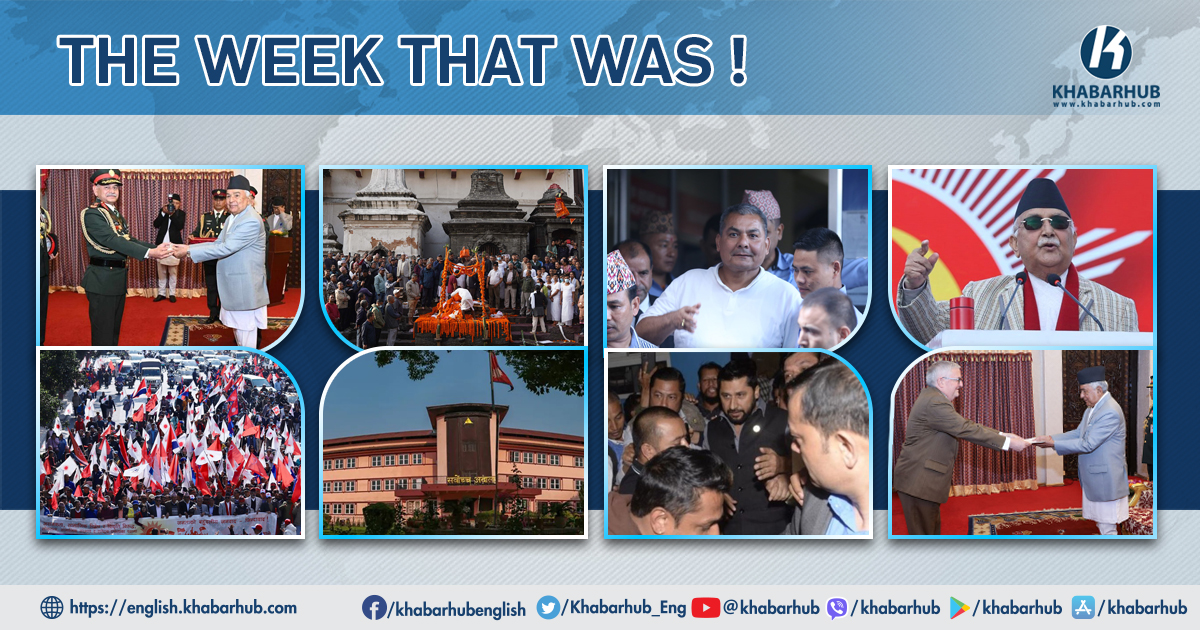KATHMANDU: Overall, the past week in Nepal saw a mix of political, legal, and diplomatic developments that reflect the nation’s ongoing struggles and achievements in governance, diplomacy, and public life.
The events involving public figures like Damannath Dhungana, Durga Prasai, and Rabi Lamichhane illustrated the complex intersection of politics, law, and public opinion, while the calls for investment and diplomatic engagements indicated the government’s ongoing efforts to improve Nepal’s global standing and economy.
Damanath Dhungana’s cremation and state honors
The week began with a solemn farewell to one of Nepal’s respected political figures, former Speaker of the House of Representatives, Damannath Dhungana.
He was cremated with state honors at the Pashupati Aryaghat, and the government declared a public holiday in his memory. Dhungana, who had been ill due to liver complications, passed away at the age of 83.
His passing left a significant void in Nepali politics, and a public tribute was held at Sano Gaucharan in Gyaneswor, with Prime Minister KP Oli attending the ceremony. His family, including his wife, two sons, and daughter, are left to mourn his loss.
Durga Prasai’s arrest
Another major development was the arrest of medical entrepreneur Durga Prasai, who was detained for spreading false information about Prime Minister KP Oli.
Prasai, known for his controversial statements, had claimed that Oli made extensive investments in Cambodia, a claim he substantiated with fake videos and documents.
This act of spreading misinformation through social media channels led to his arrest by the Central Investigation Bureau (CIB), and he now faces investigation for the alleged defamation of the Prime Minister’s character.
This arrest highlights the growing concern over the spread of misinformation, especially by influential figures in society.
Supreme Court’s ruling on riverbank land
In a significant legal development, the Supreme Court ruled that an additional 20 meters of open land should be left along riverbanks in Kathmandu Valley to preserve the environment.
However, the implementation of this decision was delayed after a petition filed by the Office of the Prime Minister questioned the legality of the verdict.
The original decision was made in December 2023, and its delayed enforcement reflects the ongoing debate over urban planning and environmental preservation in Kathmandu.
Indian Army Chief conferred honorary general rank
In a diplomatic move, General Upendra Dwivedi, the Chief of the Indian Army, was conferred the honorary rank of General of the Nepali Army by President Ram Chandra Paudel.
The ceremonial event, attended by prominent political figures, symbolizes the strong military ties between Nepal and India.
This honor, a long-standing tradition between the two nations, was bestowed during Dwivedi’s official five-day visit to Nepal, which also included a guard of honor at the Army Headquarters in Kathmandu.
KMC fines CPN-UML for littering
In a move that highlights Kathmandu’s environmental concerns, the Kathmandu Metropolitan City (KMC) imposed a fine of Rs 100,000 on the ruling CPN-UML party for polluting the environment during a public meeting.
The fine, under the Waste Management Act, was issued due to improper waste disposal during an open-air rally at Durbarmarg.
This act of negligence emphasizes the need for all political parties to adhere to environmental laws, especially in urban areas that already suffer from pollution.
PM Oli’s call for investment
Prime Minister KP Oli, while addressing a gathering organized by the CPN-UML, urged both domestic and international investors to focus on Nepal.
He highlighted the country’s improving economic conditions and the government’s commitment to creating a favorable investment climate.
The message was clear: Nepal is open for business, and the government will ensure the security and stability necessary for economic growth.
This call for investment comes at a critical juncture as Nepal seeks to revitalize its economy post-pandemic.
Cooperative fraud case and arrest warrants
In a legal drama, arrest warrants were issued against ten individuals, including Rabi Lamichhane, the leader of the Rastriya Swatantra Party (RSP), in connection with a massive cooperative fraud case in Chitwan.
The case revolves around the Sahara Chitwan Multipurpose Cooperative, where depositors have filed complaints of embezzlement.
Lamichhane’s involvement in the scandal has escalated political tensions, as his party was recently gaining traction in Nepal’s political landscape.
This case underscores the ongoing issue of financial mismanagement in cooperatives, which many Nepali citizens rely on for savings.
Diplomatic engagement with Ambassadors
In an important diplomatic move, three ambassadors from Israel, Spain, and New Zealand submitted their letters of credence to President Ram Chandra Paudel.
This ceremonial gesture reflects Nepal’s ongoing diplomatic engagements with various nations and its active participation in global affairs.
The submission of letters of credence is a formal recognition of a diplomat’s new role in a host country, and these new appointments are part of strengthening Nepal’s international relations.
Clarification from PM Oli on UML-NC relations
Prime Minister KP Oli publicly denied rumors of a rift between his CPN-UML party and the Nepali Congress (NC), two key partners in the current coalition government.
PM Oli’s comments came amid speculations that political tensions might be growing between the parties.
He assured the public that the coalition would remain intact until the next general elections in 2084 BS, signaling political stability in the near future despite occasional political drama.
CPN-UML rally in Kathmandu
The week also witnessed a large public rally organized by the ruling CPN-UML party at Durbar Marg.
Although delayed by over an hour, the event eventually proceeded with crowds gathering from various parts of Kathmandu.
This rally was a demonstration of the party’s political strength and mobilization capabilities ahead of the upcoming elections.









Comment